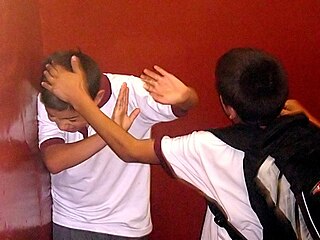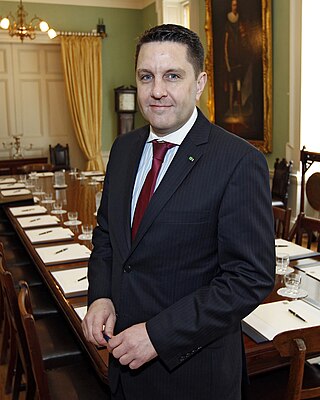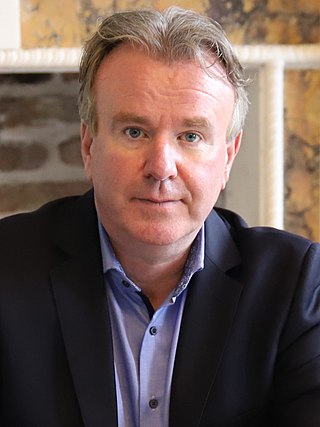
Dublin City University is a university based on the Northside of Dublin, Ireland. Created as the National Institute for Higher Education, Dublin in 1975, it enrolled its first students in 1980, and was elevated to university status in September 1989 by statute.

Bullying is the use of force, coercion, hurtful teasing or threat, to abuse, aggressively dominate or intimidate. The behavior is often repeated and habitual. One essential prerequisite is the perception of an imbalance of physical or social power. This imbalance distinguishes bullying from conflict. Bullying is a subcategory of aggressive behavior characterized by hostile intent, imbalance of power and repetition over a period of time.

The National University of Ireland, Maynooth, commonly known as Maynooth University (MU), is a constituent university of the National University of Ireland in Maynooth, County Kildare, Ireland. It was Ireland's youngest university until Technological University Dublin was established in 2019, having been founded by the Universities Act, 1997, from the secular faculties of the now separate St Patrick's College, Maynooth, which was founded in 1795. Maynooth is also the only university town in Ireland, all other universities being based within cities.

All Hallows College was a college of higher education in Dublin. It was founded in 1842 and was run by the Vincentians from 1892 until 2016. On 23 May 2014, it was announced that it was closing because of declining student enrollment. The sale of the campus in Drumcondra to Dublin City University was announced on 19 June 2015 and completed on 8 April 2016. The college closed on 30 November 2016, becoming the All Hallows Campus of Dublin City University.

Third-level education in the Republic of Ireland includes all education after second-level, encompassing higher education in universities and colleges and further education on Post Leaving Certificate (PLC) and other courses. The degree-awarding institutions which can grant awards at all academic levels are the University of Dublin, National University of Ireland, University of Limerick, Dublin City University, Technological University Dublin, the Royal College of Surgeons in Ireland, Munster Technological University, Technological University of the Shannon: Midlands Midwest, Atlantic Technological University and South East Technological University, as well as St Patrick's College, Maynooth. Quality and Qualifications Ireland, a State agency, can grant awards in other institutions directly, or delegate the authority to do so. The King's Inns of Dublin has a limited role in education specialising in the preparation of candidates for the degree of barrister-at-law to practice as barristers. Medical schools in Ireland also have particular regulation. There were seven establishments of higher education within Ireland ranked among the top 500 universities worldwide by the Times Higher Education Supplement in 2023.

St Patrick's, Carlow College, is a liberal arts college located in Carlow, Ireland. The college is the second oldest third level institution in Ireland and was founded in 1782 by James Keefe, then Roman Catholic Bishop of Kildare and Leighlin, and his co-adjutor bishop Daniel Delany.

Educational Action Challenging Homophobia (EACH) is a charity based in the United Kingdom which "affirms the lives of lesbian, gay, bisexual and trans (LGBT) people and reduces discrimination experienced because of sexual orientation or gender identity." Since 2003, EACH has delivered training and consultancy services on sexuality and gender identity matters across the statutory, voluntary and private sectors. It also provides support to those affected by homophobic, biphobic or transphobic bullying through its nationwide, freephone helpline.
Ferdinand von Prondzynski is a German-born Irish citizen who was the former university leader in Ireland and Scotland, a lawyer and legal academic, a high-profile public commentator and latterly a candidate Anglican cleric. Formerly the Principal and Vice-Chancellor of Robert Gordon University in Aberdeen, Scotland, he previously served as the second President of Dublin City University (DCU) in Ireland (2000-2010), and before that as a professor and dean at the University of Hull, and lecturer and Fellow at Trinity College Dublin.

School bullying, like bullying outside the school context, refers to one or more perpetrators who have greater physical strength or more social power than their victim and who repeatedly act aggressively toward their victim. Bullying can be verbal or physical. Bullying, with its ongoing character, is distinct from one-off types of peer conflict. Different types of school bullying include ongoing physical, emotional, and/or verbal aggression. Cyberbullying and sexual bullying are also types of bullying. Bullying even exists in higher education. There are warning signs that suggest that a child is being bullied, a child is acting as a bully, or a child has witnessed bullying at school.
The Milltown Institute of Theology and Philosophy was a Jesuit-run institution of higher education and research, located in Dublin, Ireland. It was located in Ranelagh, County Dublin.
Anti-bullying legislation is a legislation enacted to help reduce and eliminate bullying. This legislation may be national or sub-national and is commonly aimed at ending bullying in schools or workplaces.
Cyberbullying or cyberharassment is a form of bullying or harassment using electronic means. Cyberbullying and cyberharassment are also known as online bullying. It has become increasingly common, especially among teenagers and adolescents, due to the communication technology advancements and young people's increased use of such technologies. Cyberbullying is when someone, typically a teenager, bullies or harasses others on the internet and other digital spaces, particularly on social media sites.
Professor Brian Dominic MacCraith, is an Irish physicist who was the third president of Dublin City University (DCU) in Ireland. He joined DCU in 1986 and became president in July 2010, for a term of 10 years. After his term in office, he took up voluntary roles, including the chairs of Ireland's High-Level Task Force on COVID-19 Vaccination and Future of Media Commission.

James O'Higgins Norman PC, MStJ, FRSA holds the UNESCO Chair on Tackling Bullying in Schools and Cyberspace at Dublin City University. He is the director of the National Anti-Bullying Research and Resource Centre, and a member of the Government of Ireland Advisory Council on Online Safety.

University College Dublin is a public research university in Dublin, Ireland, and a member institution of the National University of Ireland. With 38,417 students, it is Ireland's largest university, and amongst the most prestigious universities in the country. Five Nobel Laureates are among UCD's alumni and current and former staff. Additionally, four Taoisigh and three Irish Presidents have graduated from UCD, along with one President of India.
Bullying in higher education refers to the bullying of students as well as faculty and staff taking place at institutions of higher education such as colleges and universities. It is believed to be common although it has not received as much attention from researchers as bullying in some other contexts. This article focuses on bullying of students; see Bullying in academia regarding faculty and staff.

Thomas Martin Clonan is an Irish senator, security analyst, author and retired Irish Army Captain. He was elected to Seanad Eireann in March 2022 in the 2022 Dublin University by-election.
Christine E. Loscher is a Professor of Biotechnology and Associate Dean for Research at Dublin City University. Loscher is director of the Health Technologies Research and Enterprise Hub. She works on bioactive molecules for autoimmune diseases.

Jane Suiter is an Irish political scientist, professor and director of Dublin City University's Institute for Future Media, Democracy, and Society ("FuJo") and research lead of Ireland's Constitutional Convention and the Citizens' Assembly. She is the co-author or co-editor of three academic books and one guide book, and over 40 journal articles. In December 2020, she was named "Researcher of the Year" by the Irish Research Council and in February 2021, she was promoted to the position of professor by DCU.

Daire Kilian Keogh is an academic historian and third-level educational leader, president of Dublin City University (DCU) since July 2020.














